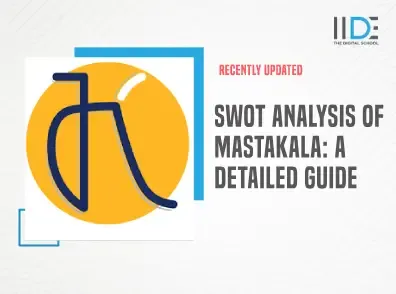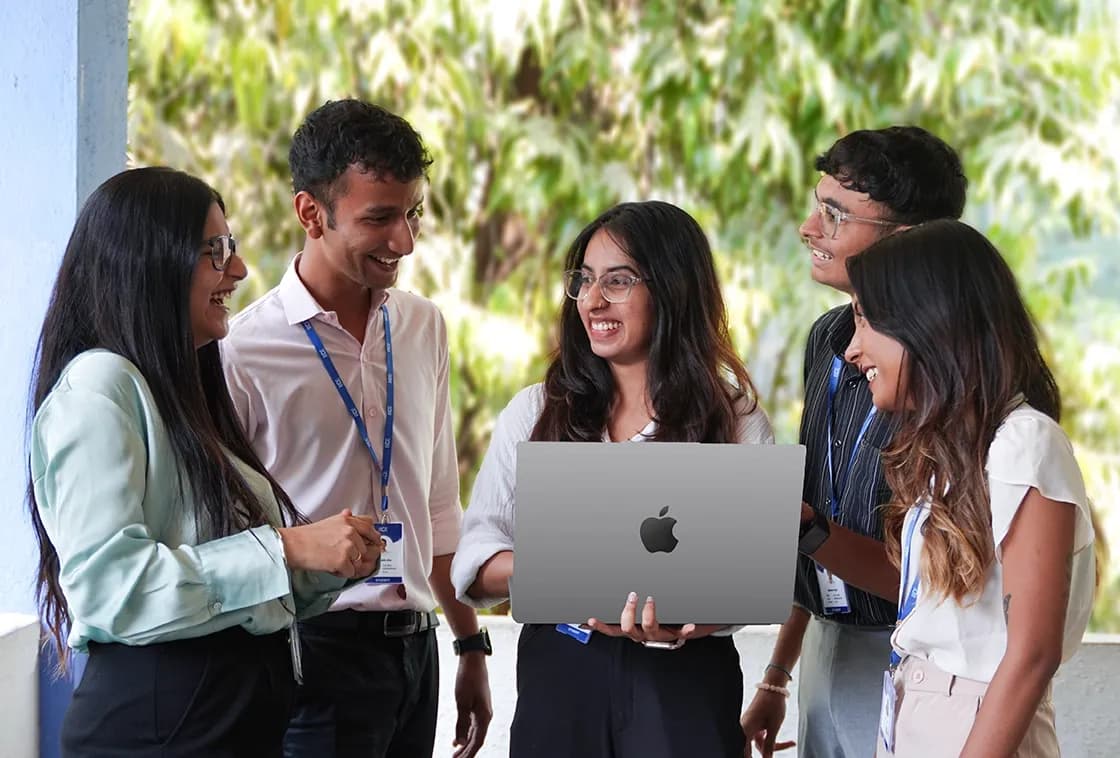
Updated on Apr 14, 2025
|2,755K+ views
The SWOT analysis of Mastakala offers a detailed look at how this Nepali brand combines traditional craftsmanship with modern design. It highlights the strengths, challenges, and opportunities Mastakala faces in Nepal's competitive market, focusing on sustainability, local artisan support, and potential growth through e-commerce and brand diversification.
In Nepal’s growing market, Mastakala has become a standout example of how traditional craftsmanship can meet modern design. By blending cultural heritage with contemporary styles, the brand has built a loyal following that values both quality and authenticity.
Mastakala’s dedication to supporting local artisans and focusing on sustainability has helped it carve out a unique space in Nepal’s competitive market. Now, let’s dive deeper into the brand’s journey and see where it stands today through the SWOT analysis of Mastakala.
As Mastakala continues to blend tradition with modern design, embracing digital tools and strategies will be crucial for reaching a larger audience. A digital marketing course in Nepal can equip individuals with the skills to effectively promote and grow brands like Mastakala in today’s competitive online landscape.


Learn Digital Marketing for FREE


About Mastakala

Mastakala is a well-known brand in Nepal, celebrated for its high-quality, locally made products that reflect the rich culture and tradition of the country.
Specialising in handcrafted items, Mastakala has built a reputation for promoting Nepali craftsmanship while offering a modern twist on traditional designs. The brand’s focus on sustainable practices and supporting local artisans has garnered it a loyal customer base in Nepal and beyond.
Mastakala’s product range spans from handmade jewelry to unique home décor pieces, all made with care and attention to detail. By combining heritage with innovation, the brand has positioned itself as a leader in the Nepali craft industry, attracting a diverse audience of conscious consumers who appreciate the value of local, sustainable products.
To understand how Mastakala has grown into the brand it is today, it's essential to dive into the SWOT analysis of Mastakala. This analysis will shed light on the company’s strengths, challenges, and future opportunities in an ever-evolving market.
SWOT Analysis of Mastakala in Nepal
Mastakala has made its mark in Nepal's market by offering beautifully crafted, sustainable products that blend traditional Nepali craftsmanship with modern designs.
To understand its position in the competitive market, it's important to look at the SWOT analysis of Mastakala, highlighting the brand's strengths, weaknesses, opportunities, and threats.
Strengths
- Unique Product Range: Mastakala's collection of handcrafted products is what sets it apart. The brand provides an array of items that celebrate Nepalese culture, which appeals to both local and international customers.
- Support for Local Artisans: One of Mastakala's major strengths is its dedication to supporting local artisans. This not only helps preserve traditional skills but also boosts the local economy, as identified when conducting a SWOT analysis of Mastakala.
- Sustainability Focus: Mastakala has built its brand around eco-friendly practices using sustainable materials. This aligns with the growing trend of conscious consumerism and is a significant strength in today's market.
Weaknesses
- Limited Brand Recognition: Despite the high quality of its products, Mastakala's recognition is still relatively limited, especially compared to larger, more established brands. This is highlighted in the SWOT analysis of Mastakala, as brand awareness is a challenge the company must address.
- Pricing Strategy: The handcrafted nature of Mastakala's products means that they come with a premium price tag. This pricing may alienate price-sensitive customers, as pointed out in the SWOT analysis of Mastakala.
- Dependence on Local Artisans: While supporting local artisans is a strength, it also poses challenges in scaling production and ensuring consistent quality, something the SWOT analysis of Mastakala emphasizes as a vulnerability.
Opportunities
- E-commerce Expansion: The rise of online shopping indicates an excellent opportunity for Mastakala to expand its reach beyond Nepal. The SWOT analysis of Mastakala identifies e-commerce as a key growth avenue, especially for reaching international customers.
- Product Line Diversification: There is potential for Mastakala to diversify its product offerings, such as by introducing more contemporary designs or collaborating with other brands. This would allow the brand to attract a broader customer base, as noted in the SWOT analysis of Mastakala.
- Collaboration with the Tourism Sector: Nepal's tourism industry presents a great opportunity for Mastakala to introduce exclusive, culturally inspired products to tourists. The SWOT analysis of Mastakala suggests that partnerships with tourism companies could increase exposure and sales.
Upskill yourself with an online e-commerce course to stay ahead of the competition!
Threats
- Competition from Mass Production: The growing availability of low-cost, mass-produced alternatives threatens Mastakala's market share. The SWOT analysis of Mastakala points to this as a major challenge, as many consumers opt for cheaper options.
- Economic Instability: Economic fluctuations can impact consumer spending, particularly on non-essential items like handcrafted goods. This is a significant risk highlighted in the SWOT analysis of Mastakala.
- Shifting Consumer Preferences: Changing tastes and the increasing preference for modern, minimalist designs can pose a threat to Mastakala's traditional offerings. The SWOT analysis of Mastakala suggests the brand must stay adaptable to these shifts.
Buyers Persona:

Radha Sharma
Kathmandu
Occupation: Marketing Executive
Age: 29
Motivations
- Supporting local artisans and businesses
- Purchasing unique, handmade, and eco-friendly products
- Sustainable and ethical shopping practices
Interest & Hobbies
- Art and design
- Traveling to cultural destinations
- Yoga, meditation, and wellness
- Sustainable fashion
Pain Points
- Limited availability of authentic handmade products
- High prices for quality handmade goods
- Difficulty finding sustainable and eco-friendly options
- Limited product variety
Social Media Presence
- YouTube
Failed Campaign: Mastakala's Social Media Promotion
Mastakala, a Nepali startup specializing in customized wooden gifts, launched a social media campaign on TikTok to promote their products.
Issues Encountered: The campaign faced criticism for perceived insensitivity. For instance, a TikTok video titled "When you're an introvert and just trying to help" received negative feedback for its content.
Backlash: The brand faced backlash for content that some viewers found inappropriate or insensitive.
Brand's Response: In response to the feedback, Mastakala removed the controversial video from their TikTok account. They acknowledged the concerns raised by viewers and committed to creating content that aligns with their audience's values. Moving forward, the brand focused on showcasing its products and the craftsmanship involved, aiming to engage its audience positively.
Top Competitors
Here's a list of Mastakala's top competitors in Nepal:
- Aryamman Interior Solutions Pvt Ltd: Provides interior design solutions, competing in the handcrafted products sector.
- SC Goldhouse Concept SRL: SC Goldhouse Concept SRL offers design and manufacturing services, contributing to the competitive landscape of handcrafted products in Nepal.
- Yatri Motorcycles: An electric motorcycle manufacturer aiming to revolutionize urban mobility in Nepal with high-tech engineering and premium features.
Want to Know Why 2,50,000+ Students Trust Us?
Dive into the numbers that make us the #1 choice for career success

Live & Online
Best For
Working Professionals
Mode of Learning
Online
Starts from
Mar 6, 2026
Duration
4-6 Months

Online
Best For
AI Enthusiasts
Mode of Learning
Online
Duration
5 Months

Offline
Best For
12th Passouts
Mode of Learning
On Campus (Mumbai)
Duration
3 Years
Recent Post
Conducting a SWOT analysis of Mastakala is important because it helps to assess the brand’s current strengths and weaknesses, understand its market position, and identify opportunities for growth, ensuring Mastakala can navigate the competitive Nepali handicraft market effectively.
The SWOT analysis of Mastakala highlights its unique handcrafted products, focus on sustainability, and strong support for local artisans as key strengths that differentiate the brand.
The SWOT analysis of Mastakala provides a roadmap for addressing challenges like limited brand recognition and pricing while identifying opportunities for growth, especially in e-commerce and product diversification.
According to the SWOT analysis of Mastakala, the brand faces challenges such as limited recognition outside major urban areas, high product pricing, and dependency on local artisans for production.
The SWOT analysis of Mastakala suggests opportunities such as expanding online sales, collaborating with international brands, and exploring new product lines to attract a broader audience.
Mastakala acknowledges the competitive pressure from mass-produced alternatives and suggests focusing on authenticity, quality, and sustainability as a way to stay ahead in the market.
By focusing on its commitment to local craftsmanship and sustainable practices, as outlined in the SWOT analysis of Mastakala, the brand can further differentiate itself and appeal to conscious consumers both locally and globally.
Aditya Shastri leads the Business Development segment at IIDE and is a seasoned Content Marketing expert. With over a decade of experience, Aditya has trained more than 20,000 students and professionals in digital marketing, collaborating with prestigious institutions and corporations such as Jet Airways, Godrej Professionals, Pfizer, Mahindra Group, Publicis Worldwide, and many others. His ability to simplify complex marketing concepts, combined with his engaging teaching style, has earned him widespread admiration from students and professionals alike.
Aditya has spearheaded IIDE’s B2B growth, forging partnerships with over 40 higher education institutions across India to upskill students in digital marketing and business skills. As a visiting faculty member at top institutions like IIT Bhilai, Mithibai College, Amity University, and SRCC, he continues to influence the next generation of marketers.
Apart from his marketing expertise, Aditya is also a spiritual speaker, often traveling internationally to share insights on spirituality. His unique blend of digital marketing proficiency and spiritual wisdom makes him a highly respected figure in both fields.